Unit 1 -Unit 4 期中语法知识总复习课件(共42张PPT) 2023-2024学年牛津译林版八年级英语上册
文档属性
| 名称 | Unit 1 -Unit 4 期中语法知识总复习课件(共42张PPT) 2023-2024学年牛津译林版八年级英语上册 |
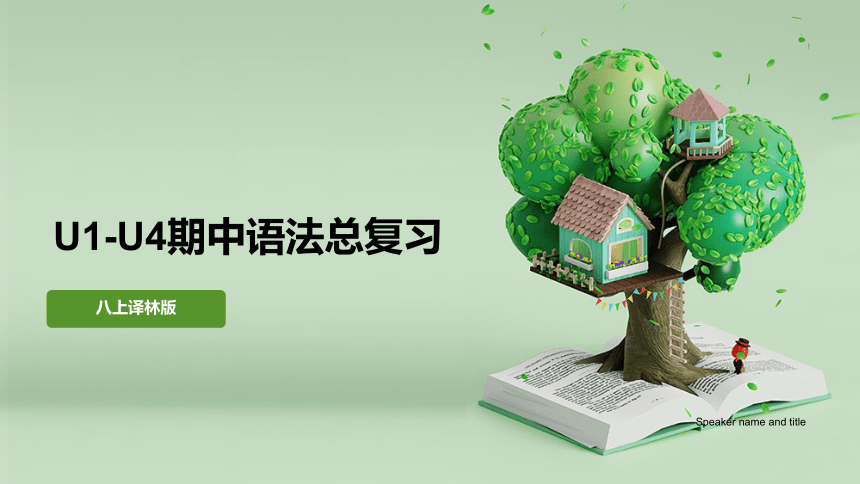
|
|
| 格式 | pptx | ||
| 文件大小 | 910.7KB | ||
| 资源类型 | 教案 | ||
| 版本资源 | 牛津译林版 | ||
| 科目 | 英语 | ||
| 更新时间 | 2023-07-21 00:00:00 | ||
图片预览

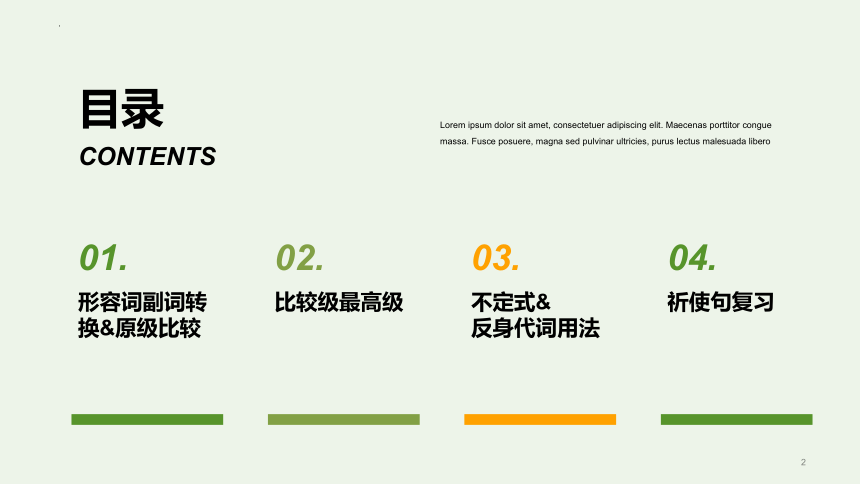
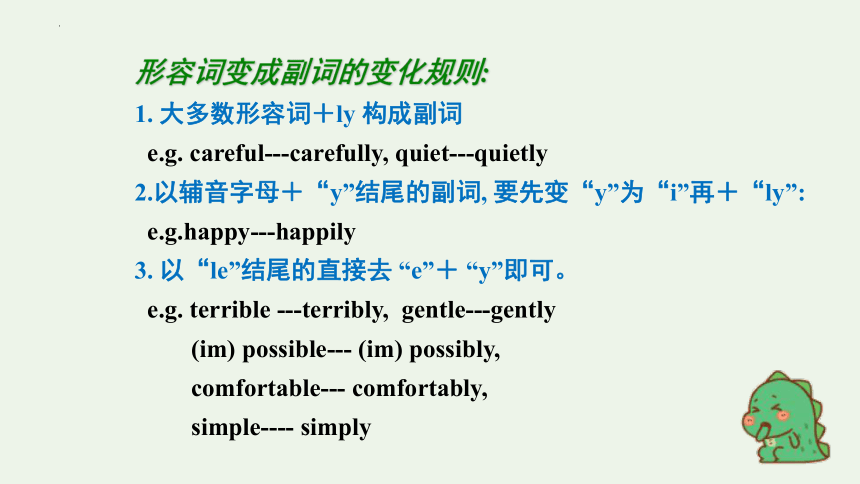
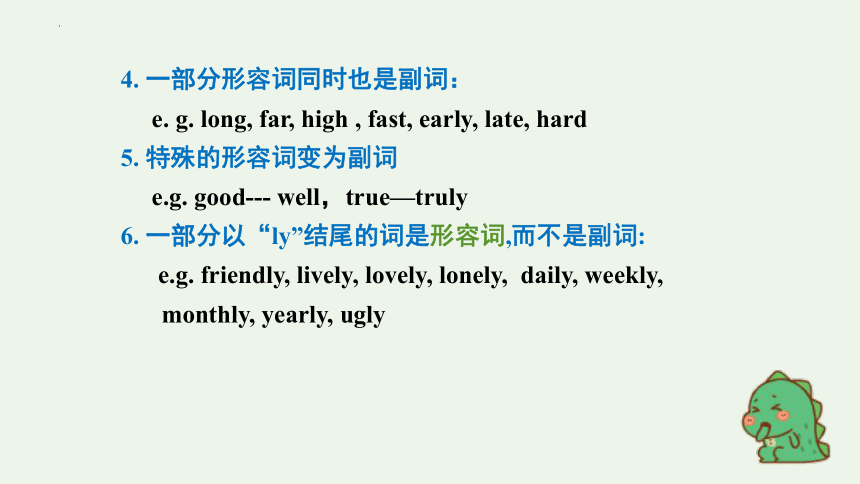
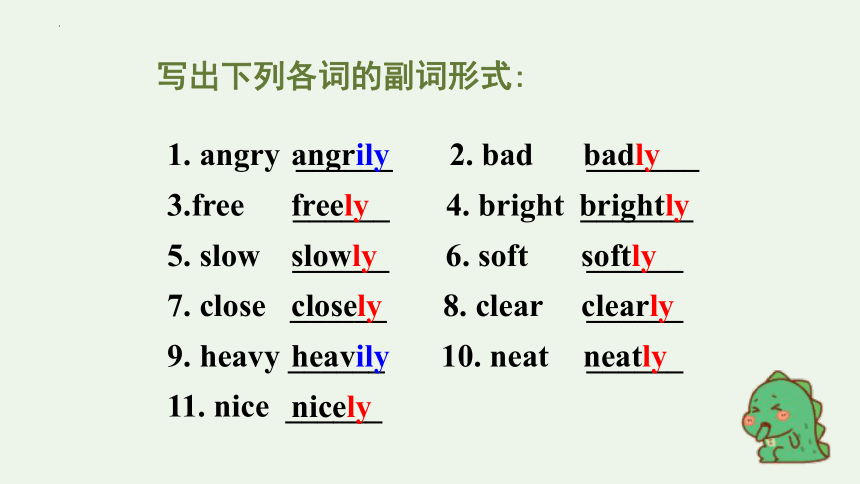
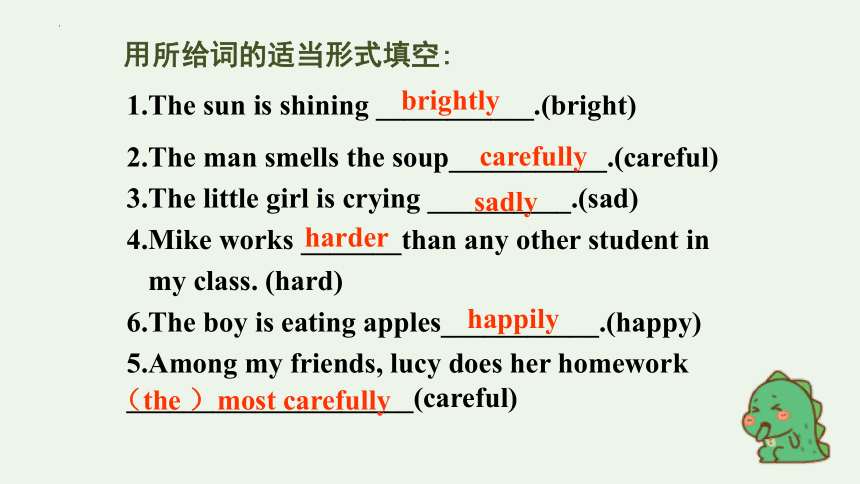
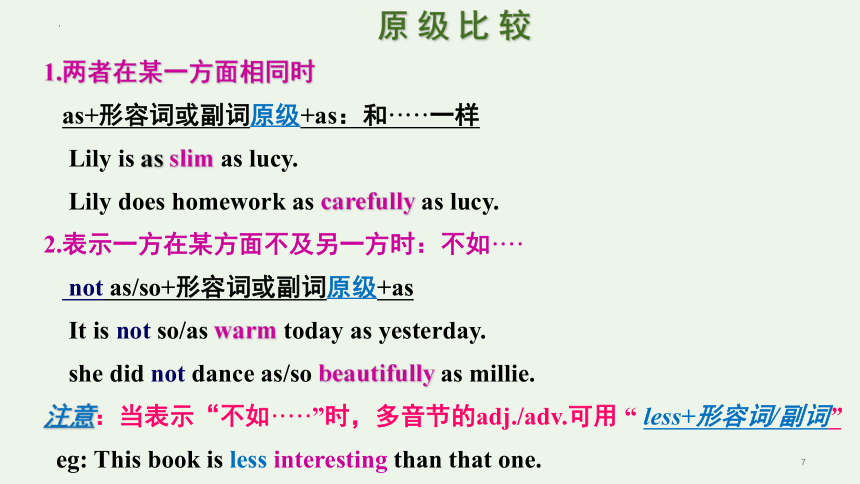
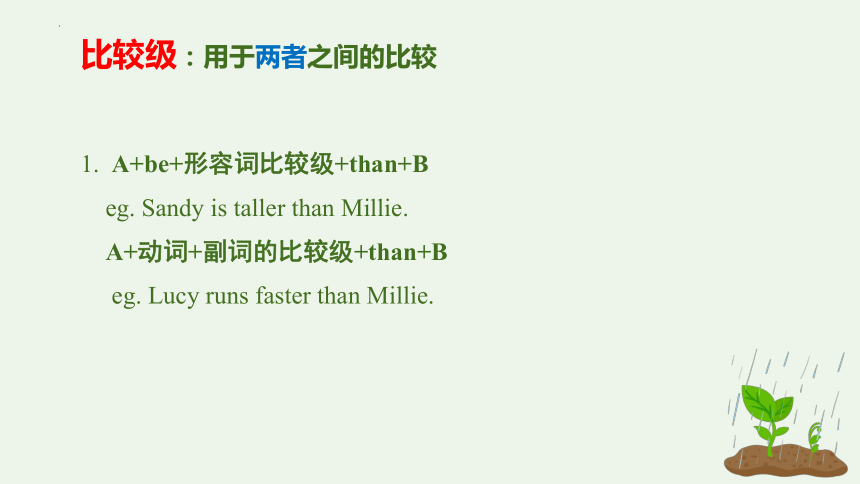
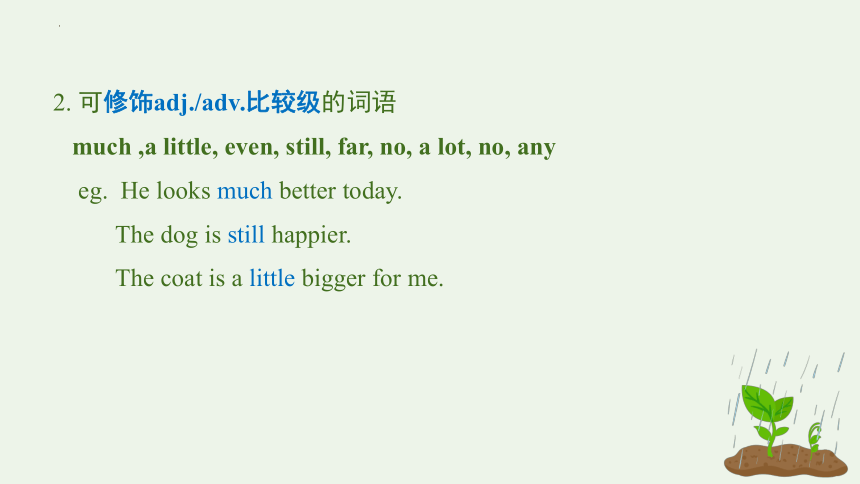
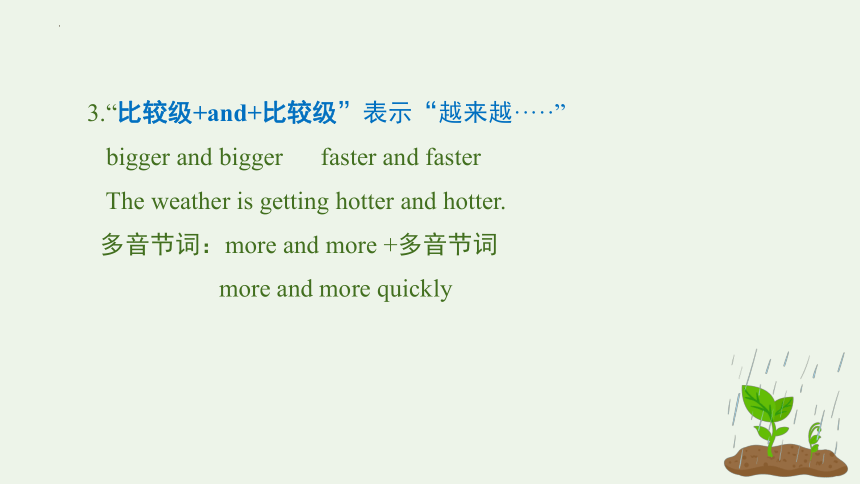
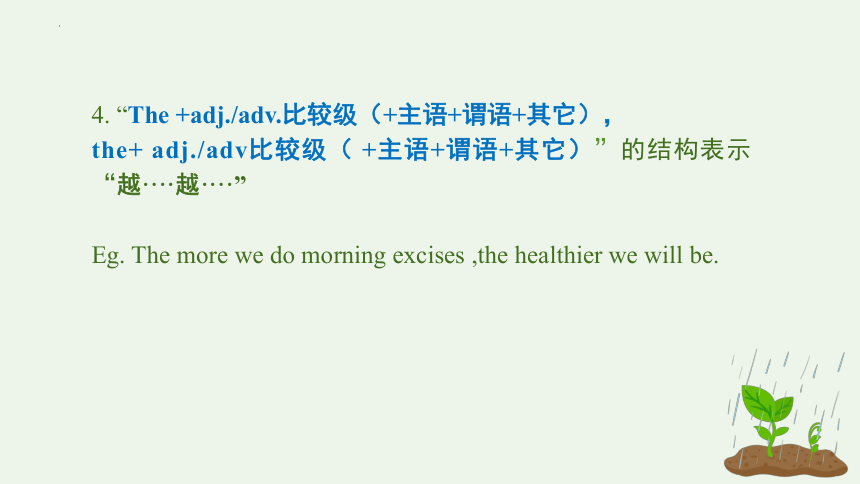
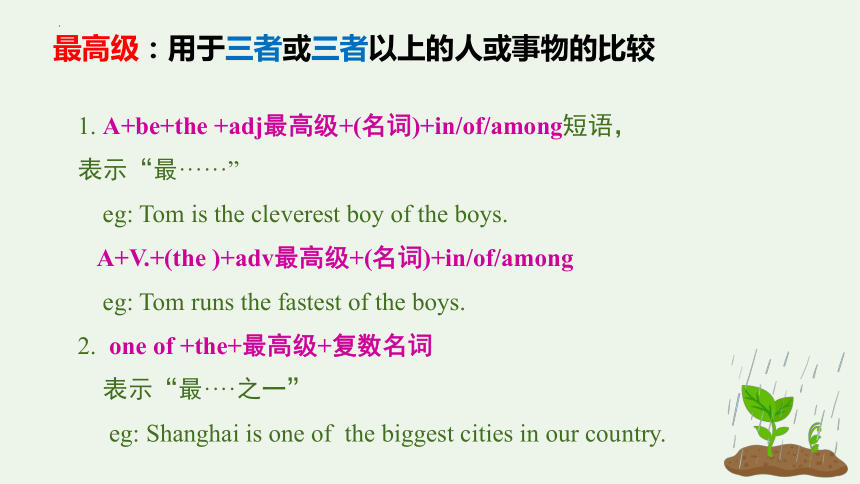
文档简介
(共42张PPT)
U1-U4期中语法总复习
八上译林版
Speaker name and title
2
不定式&
反身代词用法
03.
形容词副词转换&原级比较
01.
比较级最高级
02.
祈使句复习
04.
Lorem ipsum dolor sit amet, consectetuer adipiscing elit. Maecenas porttitor congue massa. Fusce posuere, magna sed pulvinar ultricies, purus lectus malesuada libero
CONTENTS
目录
形容词变成副词的变化规则:
1. 大多数形容词+ly 构成副词
e.g. careful---carefully, quiet---quietly
2.以辅音字母+“y”结尾的副词, 要先变“y”为“i”再+“ly”:
e.g.happy---happily
3. 以“le”结尾的直接去 “e”+ “y”即可。
e.g. terrible ---terribly, gentle---gently
(im) possible--- (im) possibly,
comfortable--- comfortably,
simple---- simply
4. 一部分形容词同时也是副词:
e. g. long, far, high , fast, early, late, hard
5. 特殊的形容词变为副词
e.g. good--- well,true—truly
6. 一部分以“ly”结尾的词是形容词,而不是副词:
e.g. friendly, lively, lovely, lonely, daily, weekly, monthly, yearly, ugly
1. angry ______ 2. bad _______
3.free ______ 4. bright _______
5. slow ______ 6. soft ______
7. close ______ 8. clear ______
9. heavy ______ 10. neat ______
11. nice ______
angrily badly
freely brightly
slowly softly
closely clearly
heavily neatly
nicely
写出下列各词的副词形式:
1.The sun is shining ___________.(bright)
2.The man smells the soup___________.(careful)
3.The little girl is crying __________.(sad)
4.Mike works _______than any other student in
my class. (hard)
6.The boy is eating apples___________.(happy)
5.Among my friends, lucy does her homework ____________________(careful)
carefully
sadly
brightly
harder
(the )most carefully
happily
用所给词的适当形式填空:
7
原 级 比 较
1.两者在某一方面相同时
as+形容词或副词原级+as:和·····一样
Lily is as slim as lucy.
Lily does homework as carefully as lucy.
2.表示一方在某方面不及另一方时:不如····
not as/so+形容词或副词原级+as
It is not so/as warm today as yesterday.
she did not dance as/so beautifully as millie.
注意:当表示“不如·····”时,多音节的adj./adv.可用 “ less+形容词/副词”
eg: This book is less interesting than that one.
比较级:用于两者之间的比较
1. A+be+形容词比较级+than+B
eg. Sandy is taller than Millie.
A+动词+副词的比较级+than+B
eg. Lucy runs faster than Millie.
2. 可修饰adj./adv.比较级的词语
much ,a little, even, still, far, no, a lot, no, any
eg. He looks much better today.
The dog is still happier.
The coat is a little bigger for me.
9
3.“比较级+and+比较级”表示“越来越·····”
bigger and bigger faster and faster
The weather is getting hotter and hotter.
多音节词:more and more +多音节词
more and more quickly
11
4. “The +adj./adv.比较级(+主语+谓语+其它),
the+ adj./adv比较级( +主语+谓语+其它)”的结构表示“越····越····”
Eg. The more we do morning excises ,the healthier we will be.
最高级:用于三者或三者以上的人或事物的比较
1. A+be+the +adj最高级+(名词)+in/of/among短语,
表示“最······”
eg: Tom is the cleverest boy of the boys.
A+V.+(the )+adv最高级+(名词)+in/of/among
eg: Tom runs the fastest of the boys.
2. one of +the+最高级+复数名词
表示“最····之一”
eg: Shanghai is one of the biggest cities in our country.
13
3.“序数词+最高级+名词单数”表示“第几····最”
The Yellow River is the second longest river in China.
黄河是中国第二长河。
提醒:
①形容词最高级前有物主代词或指示代词,名词所有格等限定修饰时,不再加the.
Milie’s best friend is Amy.
②当两个最高级的形容词修饰同一个名词时,后一个最高级的形容词前的the要省略
Sandy is the youngest and cleverest boy in my class.
选择填空
1. Which does Jimmy like ,Chinese or Art A. well B. best C. better D. much
2. The Chang jiang River is one of in the world.
the longest river B. longest rivers
C. the longest rivers D. longer rivers
of the two women is Mrs Brown.
A. The beautiful B. The more beautiful
C.More beautiful D. The most beautiful
4. My mooncake is nicer his. A. like B. with C. for D. than
选择填空
1. Which does Jimmy like ,Chinese or Art A. well B. best C. better D. much
2. The Chang jiang River is one of in the world.
the longest river B. longest rivers
C. the longest rivers D. longer rivers
of the two women is Mrs Brown.
A. The beautiful B. The more beautiful
C.More beautiful D. The most beautiful
4. My mooncake is nicer his. A. like B. with C. for D. than
C
C
B
D
6. He jumps______ of the three. A. far B. further C. farthest D. farther
7. My hair is longer than__________ . A. my sister B. Kate C. my brother’s D. Lucys’
8. There is_____paper here .Please bring some.
A. little B. less C. fewer D. a little
9. The pen is______than that one.
A. more cheap B. cheap C. much cheaper D. quite cheaper
6. He jumps______ of the three. A. far B. further C. farthest D. farther
7. My hair is longer than__________ . A. my sister B. Kate C. my brother’s D. Lucys’
8. There is_____paper here .Please bring some.
A. little B. less C. fewer D. a little
9. The pen is______than that one.
A. more cheap B. cheap C. much cheaper D. quite cheaper
C
C
A
C
10.Tom speaks Chinese_______ better than Jimmy.
A. more B. very C. a lot of D. much
11.There are_______ girls in Class Two than in Class Four.
A. more B. nicest C. most D. best
12.It’s too_____for you to do that. A. easy B. more dangerous C. harder D. the easiest
13.Who has_______ apples now, Jim, Lily or Lucy A. much B. biggest C. better D. the most
14.You have more rulers than me. But______ are nicer than .
A.mine, yours B. mine, your C. my, yours D. my, your
10.Tom speaks Chinese_______ better than Jimmy.
A. more B. very C. a lot of D. much
11.There are_______ girls in Class Two than in Class Four.
A. more B. nicest C. most D. best
12.It’s too_____for you to do that. A. easy B. more dangerous C. harder D. the easiest
13.Who has_______ apples now, Jim, Lily or Lucy A. much B. biggest C. better D. the most
14.You have more rulers than me. But______ are nicer than .
A.mine, yours B. mine, your C. my, yours D. my, your
D
A
A
D
A
15.Tingting is_____than Meimei, but Meimei is___-than Tingting
A. tall, stronger B. taller, strongest
C. tallest, strong D. taller, stronger
16.Mother is_____in my family.
A. busy B. busier C. the busiest D. more busy
17.There are _____ in the park on Sunday.
A.more children B. a lot of people
C. much men and women D. many peoples
15.Tingting is_____than Meimei, but Meimei is___-than Tingting
A. tall, stronger B. taller, strongest
C. tallest, strong D. taller, stronger
16.Mother is_____in my family.
A. busy B. busier C. the busiest D. more busy
17.There are _____ in the park on Sunday.
A.more children B. a lot of people
C. much men and women D. many peoples
D
C
B
D
动词不定式没有人称和数的变化,在句子中不能作谓语。
结构: to+动词原形(有时可以不带to)
否定:not to+动词原形
The girl decided to do it herself.
My teacher told me not to talk in the class.
1. 什么是动词不定式?
2.动词不定式的用法
动词不定式具有名词、形容词和副词的特征。因此在句中可以做主语、表语、宾语、宾语补足语、定语和状语,但不可以作谓语。
3. 动词不定式作宾语
后面能接不定式作宾语的动词有很多,如
agree, begin(start), decide, hope, learn, plan, prepare, want, forget , remember ,wish, would like等。
e.g. We hope to get there before dark.
我们希望天黑以前到那儿。
The girl decided to do it herself.
那个姑娘决定自己做那件事。
4. 动词不定式作宾语补足语
1). 后面能接不定式作宾语补足语的动词有:ask, order, teach, tell, want, wish, help + sb. to do sth等。如:
I want both of you to go.
我要你们俩去。
We helped her (to) repair her bike.
我们帮助她修理自行车。
2). 不带to的不定式。
一感( feel),
二听(see, watch ),
三使让(let, have, make)
四看( see, watch, notice, look )
半帮助(help) + do sth 即用不带to的不定式作宾补。 如:
Let’s have a rest.
我们休息一会吧。
I saw him come in.
我看见他进来了。
The dog makes us laugh.
1.They are preparing ______________(have) a sports meeting.
2.Jim agreed ________________(go) to the West Lake.
3.It’s easy ______________(play) softball.
4. What made you_______________ (feel) sad
5.Mr White learned _______________(ride) a horse last year
6. We will try our best _______________(read) more books.
7. Let’s _______________(share) our joys together.
8. Where do you plan__________________(visit ) next year
9.Max decided____________________(stay) with us at home.
10. Are you ready________________(drive) me home
1.They are preparing ______________(have) a sports meeting.
2.Jim agreed ________________(go) to the West Lake.
3.It’s easy ______________(play) softball.
4. What made you_______________ (feel) sad
5.Mr White learned _______________(ride) a horse last year
6. We will try our best _______________(read) more books.
7. Let’s _______________(share) our joys together.
8. Where do you plan__________________(visit ) next year
9.Max decided____________________(stay) with us at home.
to have
to go
to play
feel
to ride
to read
share
to visit
to stay
10. Are you ready________________(drive) me home
to drive
29
反身代词
第一人称 第二人称 第三人称
单数 myself yourself himself
herself
itself
复数 ourselves yourselves themselves
30
反身代词
反身代词主要用作宾语(动词宾语和介词宾语)和同位语。如:
All of them enjoyed themselves. 所有的人都玩得很好。
Help yourself to some fish. 请自己动手吃点鱼吧。
【说明】反身代词有时用于 be, feel, seem, look 等后作表语,表示身体或精神处于正常状态。如:
You don’t seem yourself today. 你今天好像不太好。
31
反身代词
for oneself 给(为)自己,独自 to oneself 对自己
say to oneself 心里想 talk / speak to oneself 自言自语
come to oneself 苏醒过来 absent oneself 缺席
beside oneself 失常,若狂 by oneself 独自地,单独地
of oneself 独自,自发地
Fill in the blanks with reflexive pronouns
1.Boys and girls, help _____________to some apples.
2. Can your little sister look after _______________
3.My brother began to teach ____________English in her thirties.
4.Make _____________at home, Kitty.
5. Do you want to leave your children by______________at home
6.Mary’s grandfather fell down and hurt______________.
7.Amy and I can work out the problems ________________.
8.Look! The cay is washing______________in the sun.
9. I decided to do the work_______________.
e here, Peter . You must do the work by _____________.
Fill in the blanks with reflexive pronouns
1.Boys and girls, help _____________to some apples.
2. Can your little sister look after _______________
3.My brother began to teach ____________English in her thirties.
4.Make _____________at home, Kitty.
5. Do you want to leave your children by______________at home
6.Mary’s grandfather fell down and hurt______________.
7.Amy and I can work out the problems ________________.
8.Look! The cay is washing______________in the sun.
9. I decided to do the work_______________.
e here, Peter . You must do the work by _____________.
yourselves
herself
himself
yourself
themselves
himself
ourselves
itself
myself
yourself
什么是祈使句?
用于表达命令、请求、劝告、警告、禁止等的句子叫做祈使句,祈使句最常用于表达命令,因此在也常称为命令句。
Do型(即:动词原形(+宾语)+其它成分)。
如: Sit down. 坐下。
有的祈使句在意思明确的情况下,动词可省
如:This way, please. = Go this way, please. 请这边走。
否定形式:在句首加do not (don’t)
eg:Don’t shout here.
36
2. Be型(即:Be + 表语(名词或形容词)+其它成成分)。
如:Be a good boy! 要做一个好孩子!
Be quiet!安静
否定形式:在句首加do not (don’t)
eg:Don’t be late for school.
3. Let型(即:Let + 宾语 + 动词原形 + 其它成分) 。
如: Let me help you. 让我来帮你。
Let’s go to the park.
否定形式:
①句首加don’t
eg:Don’t let him go.
② Let + 宾语 +not 动词原形 + 其它成分
e.g. Let him not go.
38
4. 有些可用no开头,用来表示禁止性的祈使句 No+v-ing/n.
如: No smoking! 禁止吸烟!
No fishing! 禁止钓鱼!
No photos!禁止拍照!
1. ____ up early tomorrow, or you can’t catch the train.
A. Getting B. Get
C. To get D. Got
2. _____ in the street. It’s dangerous.
A. Not play B. Not to play
C. Don’t play D. Don’t to play
3. Please _____ me some money, will you
A. lend B. lending
C. to lend D. be lend
1. ____ up early tomorrow, or you can’t catch the train.
A. Getting B. Get
C. To get D. Got
2. _____ in the street. It’s dangerous.
A. Not play B. Not to play
C. Don’t play D. Don’t to play
3. Please _____ me some money, will you
A. lend B. lending
C. to lend D. be lend
41
4. The film is about to begin. Please ______ seated.
A. be B. are
C. is D. being
5. _____ the boxes. You may use them later.
A. Keep B. Keeping
C. To keep D. Kept
42
4. The film is about to begin. Please ______ seated.
A. be B. are
C. is D. being
5. _____ the boxes. You may use them later.
A. Keep B. Keeping
C. To keep D. Kept
U1-U4期中语法总复习
八上译林版
Speaker name and title
2
不定式&
反身代词用法
03.
形容词副词转换&原级比较
01.
比较级最高级
02.
祈使句复习
04.
Lorem ipsum dolor sit amet, consectetuer adipiscing elit. Maecenas porttitor congue massa. Fusce posuere, magna sed pulvinar ultricies, purus lectus malesuada libero
CONTENTS
目录
形容词变成副词的变化规则:
1. 大多数形容词+ly 构成副词
e.g. careful---carefully, quiet---quietly
2.以辅音字母+“y”结尾的副词, 要先变“y”为“i”再+“ly”:
e.g.happy---happily
3. 以“le”结尾的直接去 “e”+ “y”即可。
e.g. terrible ---terribly, gentle---gently
(im) possible--- (im) possibly,
comfortable--- comfortably,
simple---- simply
4. 一部分形容词同时也是副词:
e. g. long, far, high , fast, early, late, hard
5. 特殊的形容词变为副词
e.g. good--- well,true—truly
6. 一部分以“ly”结尾的词是形容词,而不是副词:
e.g. friendly, lively, lovely, lonely, daily, weekly, monthly, yearly, ugly
1. angry ______ 2. bad _______
3.free ______ 4. bright _______
5. slow ______ 6. soft ______
7. close ______ 8. clear ______
9. heavy ______ 10. neat ______
11. nice ______
angrily badly
freely brightly
slowly softly
closely clearly
heavily neatly
nicely
写出下列各词的副词形式:
1.The sun is shining ___________.(bright)
2.The man smells the soup___________.(careful)
3.The little girl is crying __________.(sad)
4.Mike works _______than any other student in
my class. (hard)
6.The boy is eating apples___________.(happy)
5.Among my friends, lucy does her homework ____________________(careful)
carefully
sadly
brightly
harder
(the )most carefully
happily
用所给词的适当形式填空:
7
原 级 比 较
1.两者在某一方面相同时
as+形容词或副词原级+as:和·····一样
Lily is as slim as lucy.
Lily does homework as carefully as lucy.
2.表示一方在某方面不及另一方时:不如····
not as/so+形容词或副词原级+as
It is not so/as warm today as yesterday.
she did not dance as/so beautifully as millie.
注意:当表示“不如·····”时,多音节的adj./adv.可用 “ less+形容词/副词”
eg: This book is less interesting than that one.
比较级:用于两者之间的比较
1. A+be+形容词比较级+than+B
eg. Sandy is taller than Millie.
A+动词+副词的比较级+than+B
eg. Lucy runs faster than Millie.
2. 可修饰adj./adv.比较级的词语
much ,a little, even, still, far, no, a lot, no, any
eg. He looks much better today.
The dog is still happier.
The coat is a little bigger for me.
9
3.“比较级+and+比较级”表示“越来越·····”
bigger and bigger faster and faster
The weather is getting hotter and hotter.
多音节词:more and more +多音节词
more and more quickly
11
4. “The +adj./adv.比较级(+主语+谓语+其它),
the+ adj./adv比较级( +主语+谓语+其它)”的结构表示“越····越····”
Eg. The more we do morning excises ,the healthier we will be.
最高级:用于三者或三者以上的人或事物的比较
1. A+be+the +adj最高级+(名词)+in/of/among短语,
表示“最······”
eg: Tom is the cleverest boy of the boys.
A+V.+(the )+adv最高级+(名词)+in/of/among
eg: Tom runs the fastest of the boys.
2. one of +the+最高级+复数名词
表示“最····之一”
eg: Shanghai is one of the biggest cities in our country.
13
3.“序数词+最高级+名词单数”表示“第几····最”
The Yellow River is the second longest river in China.
黄河是中国第二长河。
提醒:
①形容词最高级前有物主代词或指示代词,名词所有格等限定修饰时,不再加the.
Milie’s best friend is Amy.
②当两个最高级的形容词修饰同一个名词时,后一个最高级的形容词前的the要省略
Sandy is the youngest and cleverest boy in my class.
选择填空
1. Which does Jimmy like ,Chinese or Art A. well B. best C. better D. much
2. The Chang jiang River is one of in the world.
the longest river B. longest rivers
C. the longest rivers D. longer rivers
of the two women is Mrs Brown.
A. The beautiful B. The more beautiful
C.More beautiful D. The most beautiful
4. My mooncake is nicer his. A. like B. with C. for D. than
选择填空
1. Which does Jimmy like ,Chinese or Art A. well B. best C. better D. much
2. The Chang jiang River is one of in the world.
the longest river B. longest rivers
C. the longest rivers D. longer rivers
of the two women is Mrs Brown.
A. The beautiful B. The more beautiful
C.More beautiful D. The most beautiful
4. My mooncake is nicer his. A. like B. with C. for D. than
C
C
B
D
6. He jumps______ of the three. A. far B. further C. farthest D. farther
7. My hair is longer than__________ . A. my sister B. Kate C. my brother’s D. Lucys’
8. There is_____paper here .Please bring some.
A. little B. less C. fewer D. a little
9. The pen is______than that one.
A. more cheap B. cheap C. much cheaper D. quite cheaper
6. He jumps______ of the three. A. far B. further C. farthest D. farther
7. My hair is longer than__________ . A. my sister B. Kate C. my brother’s D. Lucys’
8. There is_____paper here .Please bring some.
A. little B. less C. fewer D. a little
9. The pen is______than that one.
A. more cheap B. cheap C. much cheaper D. quite cheaper
C
C
A
C
10.Tom speaks Chinese_______ better than Jimmy.
A. more B. very C. a lot of D. much
11.There are_______ girls in Class Two than in Class Four.
A. more B. nicest C. most D. best
12.It’s too_____for you to do that. A. easy B. more dangerous C. harder D. the easiest
13.Who has_______ apples now, Jim, Lily or Lucy A. much B. biggest C. better D. the most
14.You have more rulers than me. But______ are nicer than .
A.mine, yours B. mine, your C. my, yours D. my, your
10.Tom speaks Chinese_______ better than Jimmy.
A. more B. very C. a lot of D. much
11.There are_______ girls in Class Two than in Class Four.
A. more B. nicest C. most D. best
12.It’s too_____for you to do that. A. easy B. more dangerous C. harder D. the easiest
13.Who has_______ apples now, Jim, Lily or Lucy A. much B. biggest C. better D. the most
14.You have more rulers than me. But______ are nicer than .
A.mine, yours B. mine, your C. my, yours D. my, your
D
A
A
D
A
15.Tingting is_____than Meimei, but Meimei is___-than Tingting
A. tall, stronger B. taller, strongest
C. tallest, strong D. taller, stronger
16.Mother is_____in my family.
A. busy B. busier C. the busiest D. more busy
17.There are _____ in the park on Sunday.
A.more children B. a lot of people
C. much men and women D. many peoples
15.Tingting is_____than Meimei, but Meimei is___-than Tingting
A. tall, stronger B. taller, strongest
C. tallest, strong D. taller, stronger
16.Mother is_____in my family.
A. busy B. busier C. the busiest D. more busy
17.There are _____ in the park on Sunday.
A.more children B. a lot of people
C. much men and women D. many peoples
D
C
B
D
动词不定式没有人称和数的变化,在句子中不能作谓语。
结构: to+动词原形(有时可以不带to)
否定:not to+动词原形
The girl decided to do it herself.
My teacher told me not to talk in the class.
1. 什么是动词不定式?
2.动词不定式的用法
动词不定式具有名词、形容词和副词的特征。因此在句中可以做主语、表语、宾语、宾语补足语、定语和状语,但不可以作谓语。
3. 动词不定式作宾语
后面能接不定式作宾语的动词有很多,如
agree, begin(start), decide, hope, learn, plan, prepare, want, forget , remember ,wish, would like等。
e.g. We hope to get there before dark.
我们希望天黑以前到那儿。
The girl decided to do it herself.
那个姑娘决定自己做那件事。
4. 动词不定式作宾语补足语
1). 后面能接不定式作宾语补足语的动词有:ask, order, teach, tell, want, wish, help + sb. to do sth等。如:
I want both of you to go.
我要你们俩去。
We helped her (to) repair her bike.
我们帮助她修理自行车。
2). 不带to的不定式。
一感( feel),
二听(see, watch ),
三使让(let, have, make)
四看( see, watch, notice, look )
半帮助(help) + do sth 即用不带to的不定式作宾补。 如:
Let’s have a rest.
我们休息一会吧。
I saw him come in.
我看见他进来了。
The dog makes us laugh.
1.They are preparing ______________(have) a sports meeting.
2.Jim agreed ________________(go) to the West Lake.
3.It’s easy ______________(play) softball.
4. What made you_______________ (feel) sad
5.Mr White learned _______________(ride) a horse last year
6. We will try our best _______________(read) more books.
7. Let’s _______________(share) our joys together.
8. Where do you plan__________________(visit ) next year
9.Max decided____________________(stay) with us at home.
10. Are you ready________________(drive) me home
1.They are preparing ______________(have) a sports meeting.
2.Jim agreed ________________(go) to the West Lake.
3.It’s easy ______________(play) softball.
4. What made you_______________ (feel) sad
5.Mr White learned _______________(ride) a horse last year
6. We will try our best _______________(read) more books.
7. Let’s _______________(share) our joys together.
8. Where do you plan__________________(visit ) next year
9.Max decided____________________(stay) with us at home.
to have
to go
to play
feel
to ride
to read
share
to visit
to stay
10. Are you ready________________(drive) me home
to drive
29
反身代词
第一人称 第二人称 第三人称
单数 myself yourself himself
herself
itself
复数 ourselves yourselves themselves
30
反身代词
反身代词主要用作宾语(动词宾语和介词宾语)和同位语。如:
All of them enjoyed themselves. 所有的人都玩得很好。
Help yourself to some fish. 请自己动手吃点鱼吧。
【说明】反身代词有时用于 be, feel, seem, look 等后作表语,表示身体或精神处于正常状态。如:
You don’t seem yourself today. 你今天好像不太好。
31
反身代词
for oneself 给(为)自己,独自 to oneself 对自己
say to oneself 心里想 talk / speak to oneself 自言自语
come to oneself 苏醒过来 absent oneself 缺席
beside oneself 失常,若狂 by oneself 独自地,单独地
of oneself 独自,自发地
Fill in the blanks with reflexive pronouns
1.Boys and girls, help _____________to some apples.
2. Can your little sister look after _______________
3.My brother began to teach ____________English in her thirties.
4.Make _____________at home, Kitty.
5. Do you want to leave your children by______________at home
6.Mary’s grandfather fell down and hurt______________.
7.Amy and I can work out the problems ________________.
8.Look! The cay is washing______________in the sun.
9. I decided to do the work_______________.
e here, Peter . You must do the work by _____________.
Fill in the blanks with reflexive pronouns
1.Boys and girls, help _____________to some apples.
2. Can your little sister look after _______________
3.My brother began to teach ____________English in her thirties.
4.Make _____________at home, Kitty.
5. Do you want to leave your children by______________at home
6.Mary’s grandfather fell down and hurt______________.
7.Amy and I can work out the problems ________________.
8.Look! The cay is washing______________in the sun.
9. I decided to do the work_______________.
e here, Peter . You must do the work by _____________.
yourselves
herself
himself
yourself
themselves
himself
ourselves
itself
myself
yourself
什么是祈使句?
用于表达命令、请求、劝告、警告、禁止等的句子叫做祈使句,祈使句最常用于表达命令,因此在也常称为命令句。
Do型(即:动词原形(+宾语)+其它成分)。
如: Sit down. 坐下。
有的祈使句在意思明确的情况下,动词可省
如:This way, please. = Go this way, please. 请这边走。
否定形式:在句首加do not (don’t)
eg:Don’t shout here.
36
2. Be型(即:Be + 表语(名词或形容词)+其它成成分)。
如:Be a good boy! 要做一个好孩子!
Be quiet!安静
否定形式:在句首加do not (don’t)
eg:Don’t be late for school.
3. Let型(即:Let + 宾语 + 动词原形 + 其它成分) 。
如: Let me help you. 让我来帮你。
Let’s go to the park.
否定形式:
①句首加don’t
eg:Don’t let him go.
② Let + 宾语 +not 动词原形 + 其它成分
e.g. Let him not go.
38
4. 有些可用no开头,用来表示禁止性的祈使句 No+v-ing/n.
如: No smoking! 禁止吸烟!
No fishing! 禁止钓鱼!
No photos!禁止拍照!
1. ____ up early tomorrow, or you can’t catch the train.
A. Getting B. Get
C. To get D. Got
2. _____ in the street. It’s dangerous.
A. Not play B. Not to play
C. Don’t play D. Don’t to play
3. Please _____ me some money, will you
A. lend B. lending
C. to lend D. be lend
1. ____ up early tomorrow, or you can’t catch the train.
A. Getting B. Get
C. To get D. Got
2. _____ in the street. It’s dangerous.
A. Not play B. Not to play
C. Don’t play D. Don’t to play
3. Please _____ me some money, will you
A. lend B. lending
C. to lend D. be lend
41
4. The film is about to begin. Please ______ seated.
A. be B. are
C. is D. being
5. _____ the boxes. You may use them later.
A. Keep B. Keeping
C. To keep D. Kept
42
4. The film is about to begin. Please ______ seated.
A. be B. are
C. is D. being
5. _____ the boxes. You may use them later.
A. Keep B. Keeping
C. To keep D. Kept
同课章节目录
